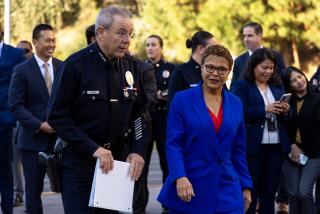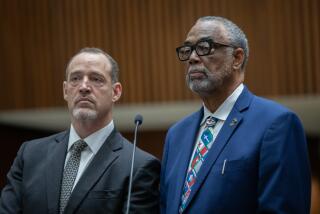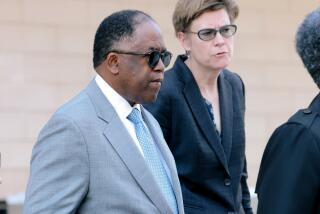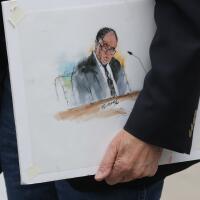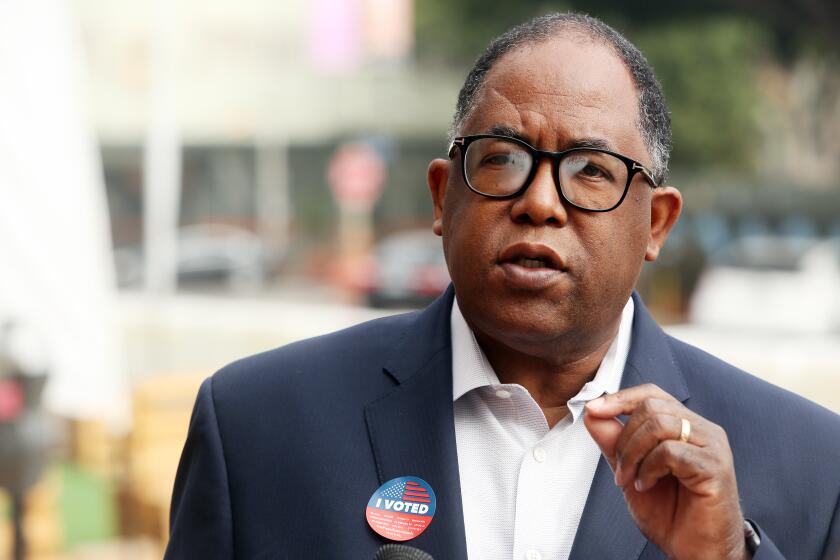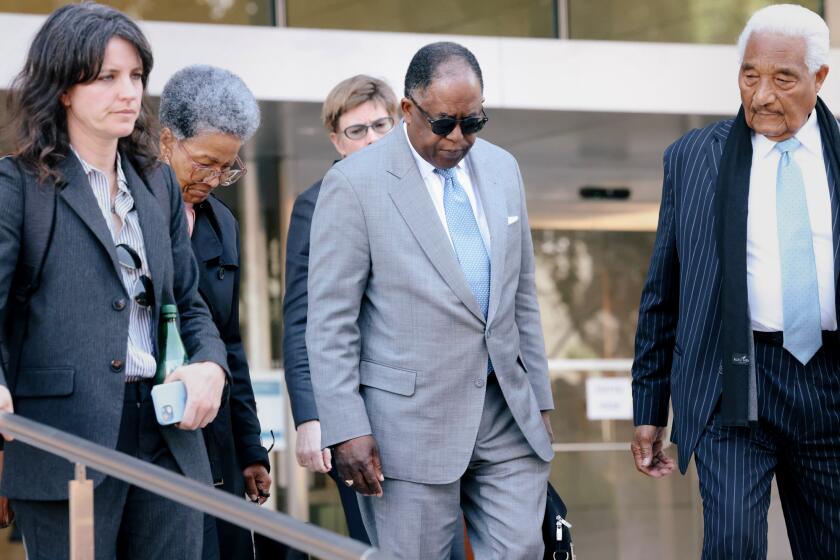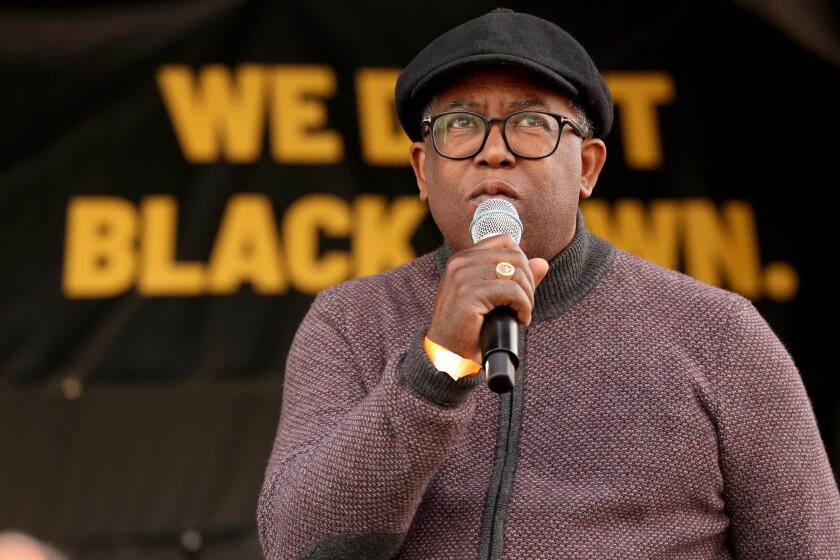Ridley-Thomas trial draws toward end with sharply conflicting portraits of politician
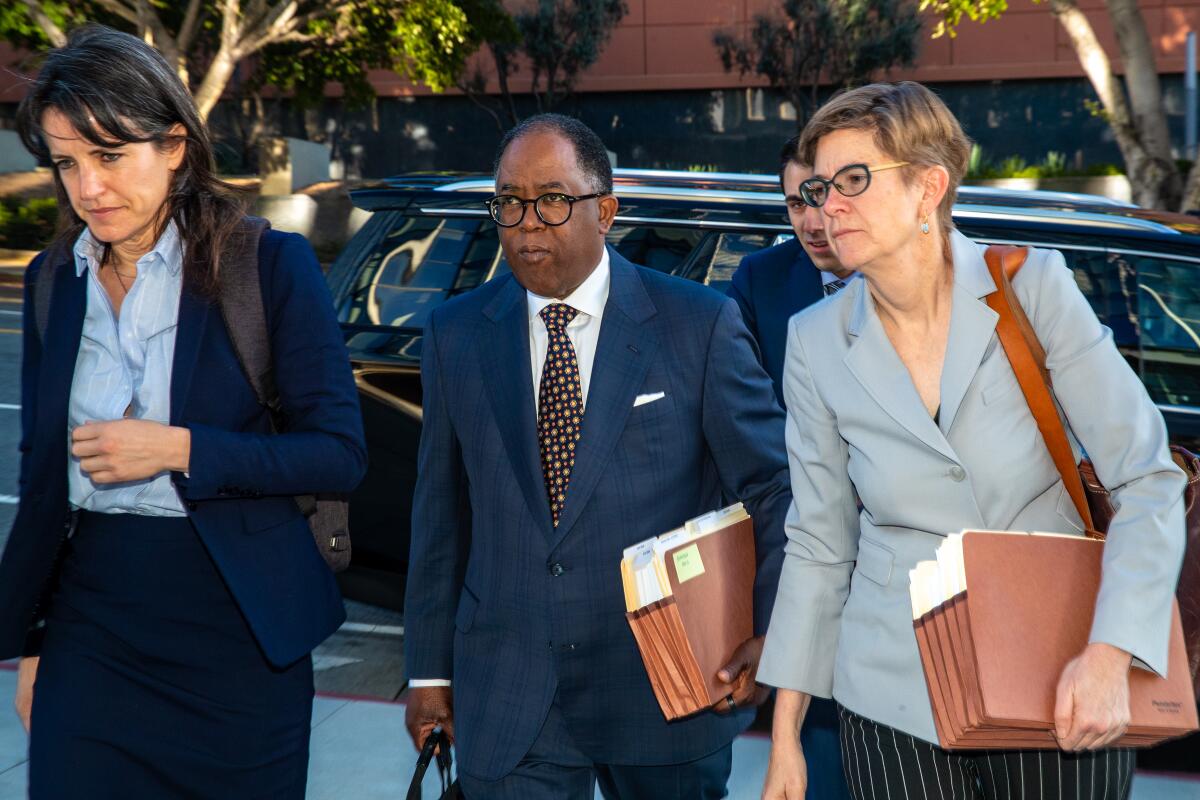
In their final words to jurors who will decide the fate of suspended Los Angeles City Councilmember Mark Ridley-Thomas, federal prosecutors and the lawmaker’s defense attorney detailed sharply conflicting portraits of the man and the case against him.
To Assistant U.S. Atty. Lindsey Greer Dotson, Ridley-Thomas was a career politician who savvily conspired with a USC dean to obtain a slew of benefits for his troubled son in exchange for help with coveted Los Angeles County business. There was no explicit agreement between Ridley-Thomas and the USC dean, Marilyn Flynn, according to the prosecutor, but “winks and nods.”
“He leveraged his power to extract privileges for his son,” Dotson said. “Public officials do not get to monetize their public service. As a politician, you work for us, you work for the taxpayer.”
To lead defense attorney Daralyn Durie, however, the charges against her client were the fruit of a sloppy investigation, one that saw crimes where none existed and one that jumped to conclusions before turning over every stone.
“Everything that happened at USC was legal,” Durie told jurors.
She noted that the L.A. County votes at issue in the case were long-running projects that Ridley-Thomas publicly backed and assigned multiple staffers to work on. The projects — for a probation training program, a reentry facility and a remote mental health clinic — were central elements of his policy agenda.
“Nobody would think he needed to be bribed to do it,” Durie said.
The 19 counts against Ridley-Thomas include conspiracy, bribery, and honest services mail and wire fraud. If convicted, the 68-year-old could spend decades in prison. Jurors won’t begin deliberations until Friday after the government completes its final arguments.
The allegations of the government center on a period from 2017 to 2018 when Ridley-Thomas allegedly conspired with Flynn, then the dean of USC’s social work program, to obtain benefits for his son — a scholarship, admission to graduate school, a professor’s job and a donation to a nonprofit.
At the time, the program was struggling financially, and Ridley-Thomas’ son, Sebastian, was a state Assembly member facing a still-confidential sexual harassment investigation.
“The defendant was in a unique position: He could come to both their rescue at the same time,” Dotson told jurors.
Dotson directed jurors to a winter 2018 email in which Flynn sent “an extremely important request for a contract amendment.” Ridley-Thomas replied, “Your wish is my command,” and blind-copied his son.
Next, the email was forwarded to Ridley-Thomas’ staff. “He’s advising his staff to do certain things,” Dotson told jurors. “That’s an official act.”
Among the benefits Ridley-Thomas received: routing $100,000 from his campaign account through USC to a nonprofit run by his son.
Dotson said that it would be easy to donate money directly to his son’s nonprofit, but that Ridley-Thomas had to hide his tracks.
“He’s got to funnel the money and clean his connection,” Dotson said, reminding jurors that an earlier donation from Ridley-Thomas to his son’s nonprofit was rejected after a parent nonprofit objected to the nepotistic optics. Dotson invoked a geographic analogy: “If I’m going to drive from downtown Los Angeles to Santa Monica, I’m not going to drive through Bakersfield.”
After the money arrived, Ridley-Thomas messaged his son, “My piece is done,” with a fist bump emoji.
A linchpin of the government’s case is now-L.A. Mayor Karen Bass’ full tuition scholarship and Flynn’s comments on it. In a 2017 email, Flynn had described her plan to offer Sebastian Ridley-Thomas a scholarship and said she did “the same for Karen Bass — full scholarship for our funds.”
“It’s not rocket science what Marilyn Flynn is looking for here,” Dotson said, laying out a simple plan to curry favor with public officials for government contracts.
But Durie highlighted that then-U.S. Rep. Bass was never charged over the email. If Bass was not a criminal, the same should hold true for her client. If the email was true, it means “Karen Bass, the current mayor of Los Angeles, would be a criminal.”
Durie also pointed to the “for our funds” as a typo — that Flynn meant “from” our funds. One slide shown in court compiled all of Flynn’s typos in emails that jurors saw — misspelled words, hastily written messages.
“Dean Flynn was like 80 years old, which is super impressive,” Durie said. “But her typing skills, much like her financial management skills, were not her strong point.”
A long-running effort of the defense has been to chip away at the prosecution’s case by laying into the credibility of the lead investigator, FBI Special Agent Brian Adkins. Throughout the trial, several witnesses who worked at L.A. County testified that they weren’t questioned by the FBI, and Durie got Adkins to acknowledge that emails at L.A. County weren’t subpoenaed during the investigation.
“This is a criminal case. If you are going to bring charges, you better be sure that you are right — and you better do your homework,” Durie said.
The defense attorney pointed out shifts in Adkins’ testimony: that he initially said he reviewed more than 400,000 documents in the case, then said either he or other agents reviewed them. Durie reminded jurors of an episode during Adkins’ testimony when she cross-examined him, and the lawyer appeared to identify an error in his timeline over whether Sebastian Ridley-Thomas was interviewed in the sexual harassment investigation.
“This whole case is about timing,” Durie said, adding, “That makes it really important not to get it mixed up.”
Durie pointed to other lapses: Investigators seemed incurious about how the county government worked and even misstated the nature of the items that make up the “quo” in the quid pro quo — two of the three items were “studies” in which further research would be done for supervisors, not contracts per se.
“Who did the government present to you as witnesses? By and large, they brought you people from USC,” Durie told jurors.
A centerpiece of the government’s case is a summer 2017 meeting with Ridley-Thomas, which Flynn later memorialized in a letter. The letter was hand-delivered to Ridley-Thomas’ office, and it outlined Flynn’s requests of the politician regarding county business.
Dotson said the letter was proof positive of Flynn and Ridley-Thomas mixing Sebastian’s extraordinary benefits at USC with county business.
Durie cast doubt on the letter: “Someone found that letter, saw that it had been hand-delivered, and thought, ‘Aha!’”
Instead, Durie said, the multi-page letter was hand-delivered because of particularly sensitive content: a demographic breakdown of the members of a research initiative on homelessness. The letter noted harshly that the committee was largely white and had no members with “lived experience,” which jeopardized the legitimacy of the research.
Prosecutors situated the sexual harassment allegations against Sebastian Ridley-Thomas — and the need to keep the brewing scandal quiet — as a driving force in the conspiracy. But Durie, in a voice that was noticeably calmer and slower than her argument, wondered aloud if jurors had friends or relatives who’ve been accused of misconduct.
“Mark Ridley-Thomas is on trial,” Durie said. “He’s certainly not on trial for anything his son did.”
In her final lines to the jury, Durie issued a plea.
“I ask you to return this man to his work, to his home, to his community and, on every charge, render a verdict of not guilty.”
More to Read
Get the L.A. Times Politics newsletter
Deeply reported insights into legislation, politics and policy from Sacramento, Washington and beyond. In your inbox three times per week.
You may occasionally receive promotional content from the Los Angeles Times.
